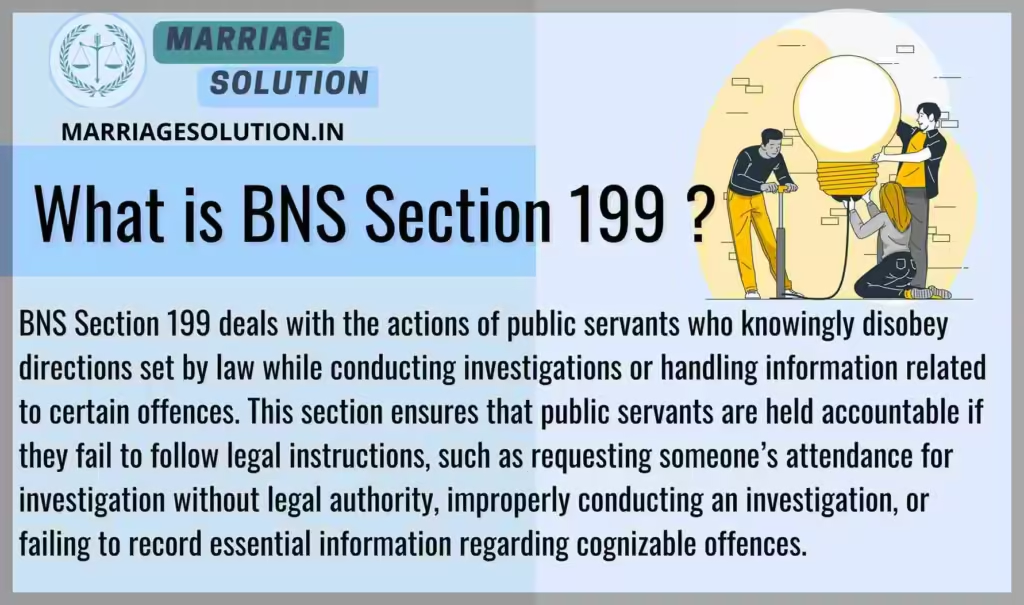Introduction of BNS 199
BNS Section 199 addresses the accountability of public servants who knowingly disobey legal directions, particularly in the context of investigations. This includes failing to record information about serious cognizable offences, conducting investigations improperly, or compelling attendance without lawful authority. The provision ensures that government officials and law enforcement officers follow the rule of law and do not misuse their powers, thereby safeguarding the rights of citizens and protecting public trust in governance.
The Bharatiya Nyaya Sanhita (BNS) Section 199 replaces the old Indian Penal Code (IPC) Section 166-A.
What is BNS Section 199 ?
BNS 199 deals with the actions of public servants who knowingly disobey directions set by law while conducting investigations or handling information related to certain offences. This section ensures that public servants are held accountable if they fail to follow legal instructions, such as requesting someone’s attendance for investigation without legal authority, improperly conducting an investigation, or failing to record essential information regarding cognizable offences.

Under Section 199 of the bns act 2023
“Whoever, being a public servant, knowingly disobeys any direction of the law regulating the manner in which he shall conduct an investigation, or fails to record any information given to him in relation to certain cognizable offences, shall be punished with rigorous imprisonment for a term which shall not be less than six months but which may extend to two years, and shall also be liable to fine.”
1. Meaning of the Section
- This section applies to public servants (government officials, police officers, etc.).
- If they knowingly disobey a legal direction while conducting an investigation, or if they fail to record important information about cognizable offences, they can be punished.
- It ensures accountability of officials and prevents misuse of authority.
2. Who is Covered?
- Police officers → who fail to record FIRs or refuse to investigate properly.
- Investigating officers → who do not follow proper procedures of law.
- Other public servants → who disobey investigation rules or act beyond their authority.
3. Key Ingredients of the Offence
For an act to be punishable under BNS 199:
- The person must be a public servant.
- They must have knowingly disobeyed legal directions, not just made a mistake.
- The disobedience should relate to investigation procedures or failure to record cognizable offences.
- The disobedience must be intentional or deliberate, not accidental.
4. Nature of the Offence
- Cognizable → Police can arrest without warrant.
- Bailable → The accused public servant can get bail.
- Non-compoundable → Cannot be settled privately; must go through trial.
- Triable by Magistrate of First Class → A higher-level Magistrate will handle the case.
5. Examples of BNS Section 199
Example 1 – Failure to Record a Cognizable Offence:
A person reports a kidnapping at the police station, but the officer refuses to register the complaint (FIR). Since kidnapping is a cognizable offence, the officer’s refusal amounts to knowingly disobeying the law and falls under BNS 199.
Example 2 – Improper Investigation:
A police officer starts investigating a theft case but deliberately ignores the legal procedure and collects evidence illegally. This improper conduct makes the officer liable under this section.
Example 3 (Not Guilty Case):
If a public servant makes a genuine mistake due to lack of information or clerical error, without intent to cause harm, they may not be punished under this section. Intentional disobedience is necessary.
6. Punishment under BNS Section 199
- Rigorous Imprisonment: Minimum 6 months, extendable up to 2 years.
- Fine: Along with imprisonment, the court may impose a fine.
- Both: In serious cases, both imprisonment and fine can be applied.
7. Importance of BNS Section 199
- Ensures Accountability: Public servants cannot misuse their powers.
- Protects Citizens’ Rights: Guarantees that cognizable offences are properly recorded and investigated.
- Maintains Transparency: Prevents negligence and misconduct in investigations.
- Upholds Rule of Law: Strengthens trust between the public and law enforcement agencies.
Section 199 BNS Overview
BNS Section 199 is a law that punishes public servants who:
- Disobey legal directions related to investigations.
- Fail to follow the proper procedure during an investigation.
- Do not record important information related to cognizable offences.
The punishment includes rigorous imprisonment for not less than 6 months, which can extend to 2 years, along with a fine.
10 Key Points of BNS Section 199
- Disobeying Legal Orders
- A public servant who knowingly ignores or disobeys a legal directive violates the law. For example, if a police officer requires someone to attend an investigation without proper legal authority, they would be in breach of this section.
- Violation in Investigation Procedure
- If a public servant conducts an investigation without following the legal process or rules, they are violating this section. For instance, if a police officer doesn’t follow the required method for collecting evidence, they can be charged under BNS Section 199.
- Failure to Record Information
- A public servant must record any information given under Section 173(1) of the Bharatiya Nagarik Suraksha Sanhita, especially in cognizable offences. Failing to do so can lead to punishment. For example, if a police officer does not log a complaint related to serious crimes like murder, they are disobeying the law.
- Specific Offences Covered
- This section covers serious offences listed under Sections 64 to 144 of the Bharatiya Nagarik Suraksha Sanhita. Public servants must be diligent when handling cases related to these offences.
- Punishment of Public Servants
- If a public servant is found guilty under this section, they face rigorous imprisonment of 6 months to 2 years and may also be fined. The imprisonment is meant to deter misconduct.
- Bailable Offence
- The offence is bailable, meaning the accused public servant can apply for bail. Despite being a serious charge, the law allows for the possibility of release while awaiting trial.
- Cognizable Offence
- The offence under BNS Section 199 is cognizable, meaning that the police have the authority to arrest the accused public servant without a warrant and start an investigation immediately.
- Non-Compoundable Offence
- The offence is non-compoundable, meaning that the parties involved cannot settle the case out of court. This ensures that serious violations of legal duties by public servants are handled through the judicial process.
- Tried by Magistrate of First Class
- The case is triable by a Magistrate of the first class. This ensures that a higher level of judicial authority oversees the trial, reflecting the seriousness of the charge.
- Protecting Public Trust
- The section is essential in maintaining the public’s trust in government authorities. It ensures that public servants are held accountable for misconduct, preserving the integrity of the legal and investigative process.
Examples:
- Example 1: Improper Investigation Procedure
- A police officer is tasked with investigating a theft case. Instead of following proper legal guidelines, the officer conducts searches without obtaining a warrant or informing the suspect. This officer could be punished under BNS Section 199 for not adhering to the rules.
- Example 2: Failure to Record Information
- A citizen reports a case of kidnapping, but the public servant fails to record the complaint in the official records. Since kidnapping is a cognizable offence, this omission is a violation of BNS Section 199, and the public servant can face imprisonment.
BNS 199 Punishment
- Imprisonment: Minimum of 6 months to a maximum of 2 years.
- Fine: In addition to imprisonment, the guilty public servant is liable to pay a fine.

BNS 199 bailable or not ?
Bailable: Yes, BNS Section 199 is bailable, meaning the accused public servant can apply for bail and be released from custody while awaiting trial.
Comparison Table – BNS Section 199 vs IPC Section 166-A
| Section | What it Means | Punishment | Bail | Cognizable? | Trial By |
|---|---|---|---|---|---|
| BNS Section 199 | Applies to any public servant who knowingly disobeys legal directions during an investigation, or fails to record information about cognizable offences. Ensures accountability in law enforcement. | Rigorous imprisonment of 6 months to 2 years, and fine. | Bailable | Cognizable | Magistrate of the First Class |
| IPC Section 166-A (Old) | Covered public servants who refused to record women’s complaints, especially in sexual offences, or disobeyed laws protecting women’s rights during investigations. | Imprisonment up to 2 years and fine. | Bailable | Cognizable | Magistrate of the First Class |
| Key Difference: BNS 199 broadens IPC 166-A by covering all cases where public servants disobey investigation laws or fail to record cognizable offences, not just those involving women. It keeps the same punishment but strengthens general accountability for official misconduct. | |||||
BNS Section 199 FAQs
What is the focus of BNS Section 199?
BNS Section 199 focuses on holding public servants accountable for disobeying legal directions during investigations or failing to record critical information about serious offenses.
What are the penalties for violating BNS Section 199?
The punishment includes rigorous imprisonment for at least 6 months, which can extend to 2 years, and a fine.
Is BNS Section 199 a bailable offense?
Yes, offenses under BNS Section 199 are bailable, allowing the accused to be released on bail.
Can public servants be arrested without a warrant under BNS Section 199?
No, since the offense is non-cognizable, the police cannot arrest a public servant without a warrant.
What types of offenses require mandatory recording of information under this section?
Public servants must record information related to serious cognizable offenses, including those mentioned in Sections 64 to 79, 124, 143, and 144 of the Bharatiya Nagarik Suraksha Sanhita, 2023.
Who is responsible for handling cases under BNS Section 199?
Cases under this section are handled by a Magistrate of the first class.
Conclusion
BNS Section 199 strengthens accountability by penalizing public servants who neglect their legal duties during investigations. By prescribing rigorous imprisonment and fines, it emphasizes the seriousness of failing to record cognizable offences or conducting improper investigations. Compared to IPC Section 166-A, which primarily focused on safeguarding women’s complaints, BNS Section 199 expands the scope to ensure fairness, transparency, and integrity in all investigations. This provision is crucial for maintaining public trust in law enforcement and upholding the rule of law.
Need Legal Support?
If you are dealing with court cases, marriage problems, or any other legal issue, our team at Marriage Solution – Lawyer Help is here for you. Simply fill out our quick online enquiry form, and we’ll connect you with the right legal expert to support your needs.
Finished with BNS 199 ? Continue exploring the next provisions of the Bharatiya Nyaya Sanhita (BNS), 2023. Each section includes explanations, examples, and plain-language breakdowns for easy understanding.
- BNS 200 : Punishment for non-treatment of victim.
- https://marriagesolution.in/bns_section/bns-200/
- BNS 201 : Public servant framing an incorrect document with intent to cause injury.
- https://marriagesolution.in/bns_section/bns-201/
- BNS 202 : Public servant unlawfully engaging in trade.
- https://marriagesolution.in/bns_section/bns-202/
- BNS 203 : Public servant unlawfully buying or bidding for property.
- https://marriagesolution.in/bns_section/bns-203/
- BNS 204 : Personating a public servant.
- https://marriagesolution.in/bns_section/bns-204/
Full IPC Section List: https://marriagesolution.in/ipc-section-list
All Indian Law & Blogs: https://marriagesolution.in/indian-law/
Full BNSS Section List: https://marriagesolution.in/bnss_section-list
